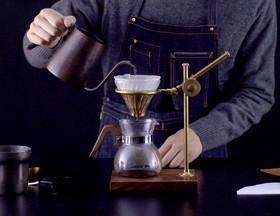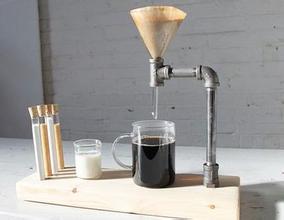Why does the second brew of coffee taste bad? what are the reasons?
When the water constantly washes away the coffee powder, the aromatic substances are constantly released. When about 22% of the aromatic substances are taken out, if you continue to inject water, the liquid will have a miscellaneous smell, just like repeatedly squeezing the fiber of sugarcane.
The soluble substance of coffee contains aromatic substances with medium and low molecular weight, as well as insoluble substances with high molecular weight. According to the dissolving rate, acid and fruit flavor are released first, followed by sugar and caramelized flavor. Finally, bitterness and impurities (ingredients that are not easily dissolved into hot water). So after normal coffee brewing, all that is left are impurities and wood fibers, and we can also say that it is a "bad substance".
Therefore, you have not wasted coffee, because the essence has been drunk by you. You don't believe me? Just smell the coffee grounds left in the filter cup. Still don't believe it? Then try to brew it again. Sometimes it's fun to verify existing conclusions. After making a cup of hand-brewed coffee for the guests, we didn't throw away the coffee grounds: drink it. Do you like this cup of water with the taste of pulp and wood? Then, another guest asked: why can't all your coffee powder be dissolved in water? The instant solution I bought can be completely dissolved, and it's not wasteful at all.
Okay, let's give you another example:
Take the soymilk we often drink as an example. Supermarkets sell bagged "soymilk powder". After stirring with water, it becomes a cup of soymilk, completely dissolved. But most families still buy a soymilk machine and buy some fresh soybeans to drink by themselves. Anyone who has beaten soybean milk knows that the last step of whole soybean milk is to filter out the soybean dregs and drink only the juice.
This is like our freshly ground coffee, brewing and filtering out the coffee grounds. Bean dregs also have its use value, can be made into other delicacies. Because of its characteristics, coffee grounds can not be eaten again, but they are also valuable: used for composting, to absorb odors, to make soap, to make beauty products, and so on. Therefore, whether it is wasteful is relatively speaking.
Each kind of food has its own characteristics, the more mellow the tea is, the more mellow it is, while the coffee beans only need to be brewed once after grinding, and brewing again will only reduce the taste of the coffee, but the loss outweighs the gain. Coffee and tea are very different, but they have the same charm and people can't put them down. I think this is the gift that nature gives to human beings.

Important Notice :
前街咖啡 FrontStreet Coffee has moved to new addredd:
FrontStreet Coffee Address: 315,Donghua East Road,GuangZhou
Tel:020 38364473
- Prev

"dripping Coffee" and "Italian espresso" are the same and different
People usually use smaller porcelain cups or glasses to enjoy espresso, and drink it very quickly. Coffee extraction time is also shorter, usually between 15-20 seconds, the length of time will directly affect the taste of coffee. Espresso can be divided into three parts: ● bottom: the deep part at the bottom of the coffee cup; ● coffee: light brown coffee solution; ● coffee oil
- Next

Four kinds of Kung Fu Coffee drinking Guide Coffee Control you drink it right?
Double espresso double espresso is basically a male drink, energetic and unpretentious, and an enhanced version of kung fu coffee for real coffee ghosts. Double does not mean doubling the amount of coffee, but the same amount of water, double the amount of coffee powder, coffee still looks like that, but the concentration has doubled. The level is equivalent to wine.
Related
- Beginners will see the "Coffee pull flower" guide!
- What is the difference between ice blog purified milk and ordinary milk coffee?
- Why is the Philippines the largest producer of crops in Liberia?
- For coffee extraction, should the fine powder be retained?
- How does extracted espresso fill pressed powder? How much strength does it take to press the powder?
- How to make jasmine cold extract coffee? Is the jasmine + latte good?
- Will this little toy really make the coffee taste better? How does Lily Drip affect coffee extraction?
- Will the action of slapping the filter cup also affect coffee extraction?
- What's the difference between powder-to-water ratio and powder-to-liquid ratio?
- What is the Ethiopian local species? What does it have to do with Heirloom native species?

